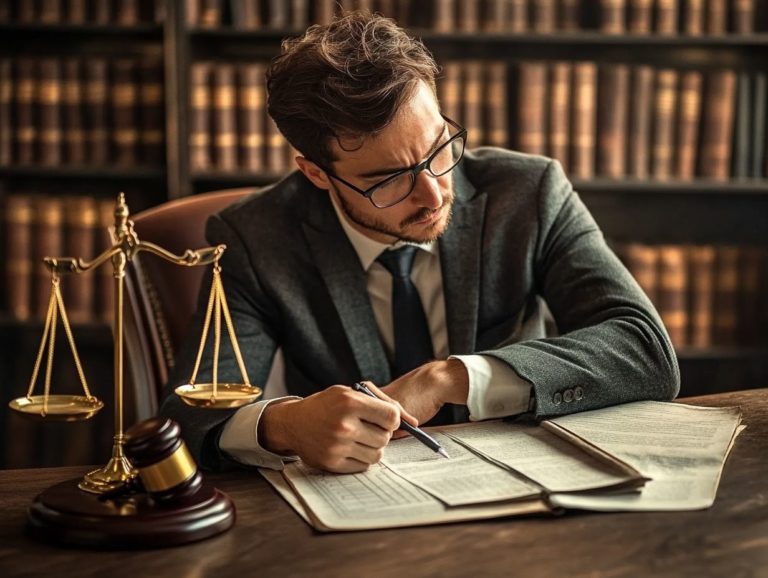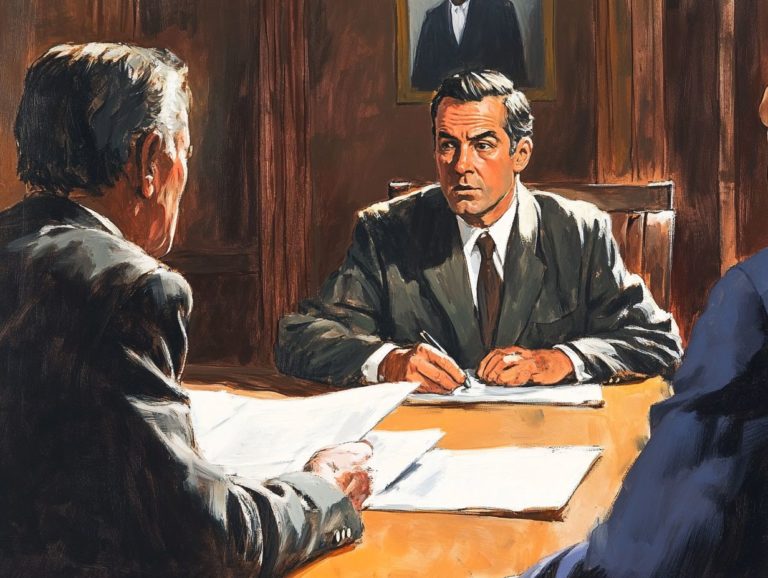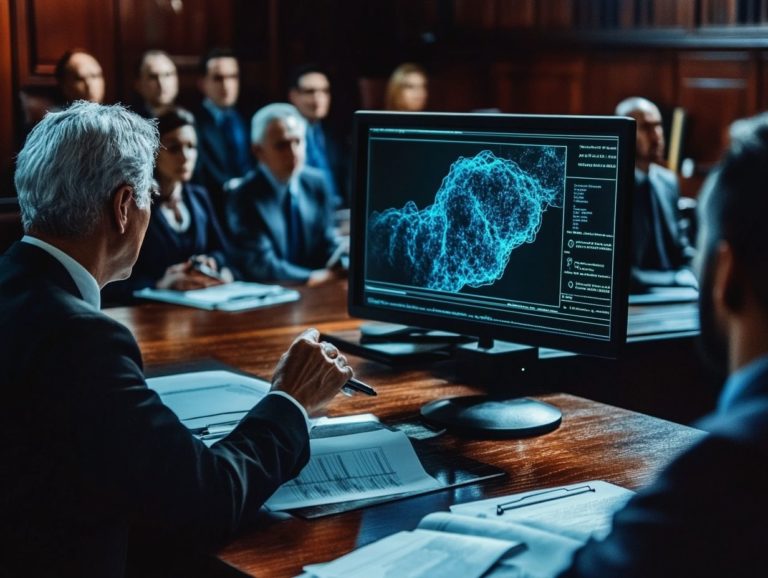How to Challenge the Prosecution’s Case
In the intricate world of legal battles, grasping the prosecution’s case is merely your starting point. This discussion unravels the key elements and evidence that underpin their arguments while identifying potential weaknesses you can exploit.
As you explore strategies for building a robust defense, gathering expert testimony, and effectively challenging the prosecution’s claims, you’ll uncover the art of crafting a compelling counter-narrative that could sway the outcome in your favor.
Dive into these essential strategies to empower your legal approach and elevate your understanding of courtroom dynamics.
Contents
- Key Takeaways:
- Understanding the Prosecution’s Case
- Identifying Weaknesses in the Case
- Building a Strong Defense
- Challenging the Prosecution’s Arguments
- Presenting a Compelling Counter-Narrative
- Frequently Asked Questions
- How can I challenge the prosecution’s case?
- What is the role of cross-examination in challenging the prosecution’s case?
- What types of evidence can I present to challenge the prosecution’s case?
- Can I challenge the prosecution’s case before trial?
- What happens if I successfully challenge the prosecution’s case?
- What if I cannot challenge the prosecution’s case?
Key Takeaways:
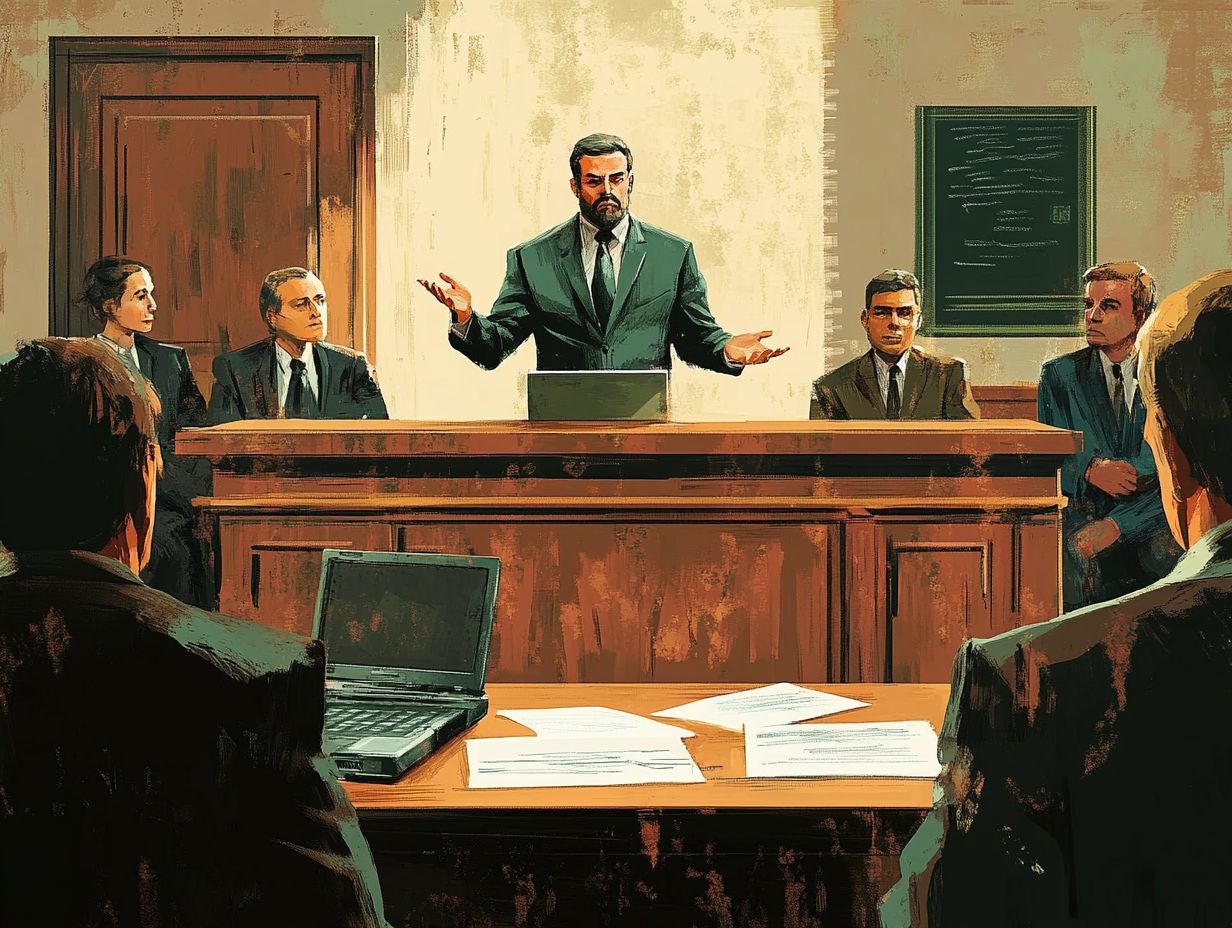
Understanding the key elements and evidence of the prosecution’s case is crucial in identifying potential weaknesses to challenge. Thoroughly examining the evidence and witnesses can help build a strong defense against the prosecution’s case. Effective strategies to discredit evidence and presenting a persuasive counter-narrative can greatly challenge the prosecution’s arguments and strengthen the defense.
Understanding the Prosecution’s Case
Understanding the prosecution’s case is vital to any effective criminal defense strategy, especially in Raleigh, North Carolina, where skilled trial lawyers like John Fanney expertly navigate complex legal terrains.
The prosecution carries the burden of proof, meaning they must present compelling evidence that overrides your presumption of innocence. This requires a thorough analysis of the specific charges you face, the evidence they present, and the strategies employed by the prosecution during the trial.
Each of these elements can profoundly impact the jury’s perception and ultimately determine the outcome of your case.
Key Elements and Evidence
Key elements of the prosecution’s case encompass the specific criminal charges, the burden of proof, and the various types of evidence presented against you. This evidence may include eyewitness accounts, forensic evidence, and character evidence.
Knowing these elements is crucial and could make or break your case! The quality and credibility of each type of evidence can significantly affect the trial’s outcome. For example, while eyewitness testimony may seem compelling, it often proves unreliable due to factors like stress or poor lighting conditions.
Conversely, forensic evidence, such as DNA samples or fingerprints, offers a scientific basis, yet it is not beyond contestation. The prosecution might bring in expert witnesses to bolster their claims, but a skilled defense attorney can effectively challenge this by scrutinizing the methods used or highlighting inconsistencies.
In essence, navigating these intricacies demands a nuanced approach, ensuring the defense presents a formidable counter to the prosecution’s assertions.
Identifying Weaknesses in the Case
Identifying weaknesses in the prosecution’s case is essential for crafting a formidable defense strategy.
In the complex criminal justice landscape of Raleigh, North Carolina, skilled trial lawyers like John Fanney thrive on dissecting the evidence and arguments presented. This meticulous analysis can significantly bolster your position and enhance your chances in court.
Examining Evidence and Witnesses
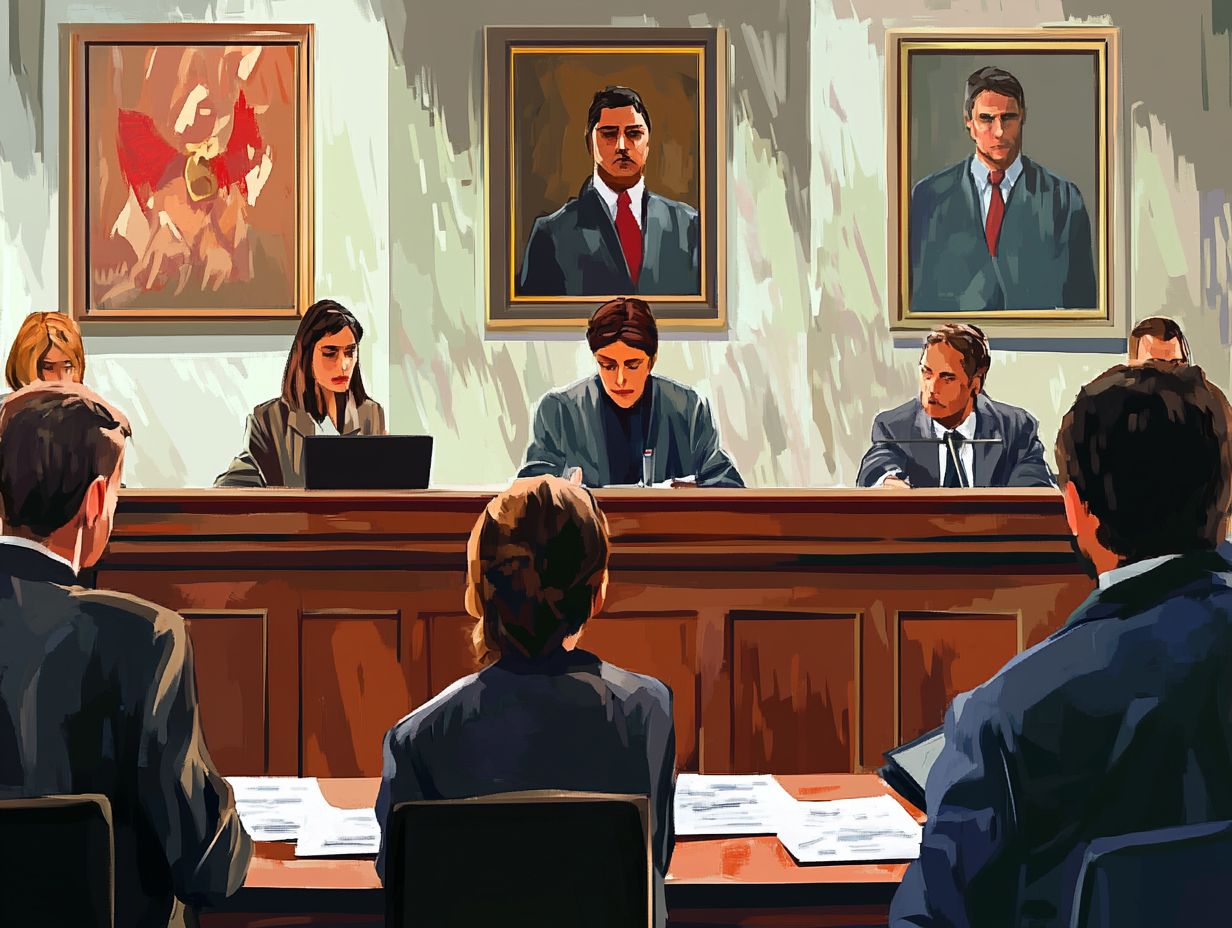
Examining evidence and assessing witness credibility is an essential step in challenging the prosecution’s case, especially considering the nuances of forensic evidence and the chain of custody that upholds its integrity.
A thorough scrutiny of both the evidence and the witnesses put forth by the prosecution can significantly sway the outcome of a trial.
As a defense attorney, you can employ various techniques to challenge a witness’s reliability, such as impeachment showing that a witness has lied before or has biases to undermine their credibility.
Questioning expert witnesses can cast doubt on the validity of the methods used to gather or analyze evidence, thereby raising uncertainties around the prosecution s claims.
Legal motions, like motions to suppress evidence or contest its admissibility, can also play a pivotal role, directly influencing the direction of the proceedings and laying a solid foundation for a strong defense strategy.
For more information or assistance with your legal defense, don t hesitate to reach out to a qualified trial lawyer today!
Building a Strong Defense
In any criminal case, building a strong defense is essential. This requires a thorough understanding of the nuances that differentiate trial lawyers and the effective defense strategies involved.
In Raleigh, North Carolina, the expertise of seasoned attorneys like John Fanney can make all the difference in building a well-crafted defense.
Gathering Evidence and Expert Testimony
Gathering evidence and expert testimony is vital for reinforcing your defense, especially when utilizing scientific evidence, like DNA or fingerprints, to clarify the complex elements of your case.
You can collect various types of evidence, from physical items gathered at the crime scene to digital data and expert analyses that provide deeper interpretations.
Forensic analysis can reveal critical details, while expert witnesses can offer specialized insights into aspects of the case, whether they involve medical evaluations or financial assessments.
This process is challenging, as you must firmly establish the authenticity and reliability of the evidence. Authenticating this evidence is essential; it enhances credibility and strengthens your overall defense strategy, ensuring everything can withstand scrutiny in court.
Challenging the Prosecution’s Arguments
Challenging the prosecution’s arguments is a crucial part of your defense strategy. It requires a good understanding of trial strategies and adept courtroom management to effectively assert your legal rights.
Mastering this process helps you navigate the courtroom confidently and precisely.
Strategies for Discrediting Evidence
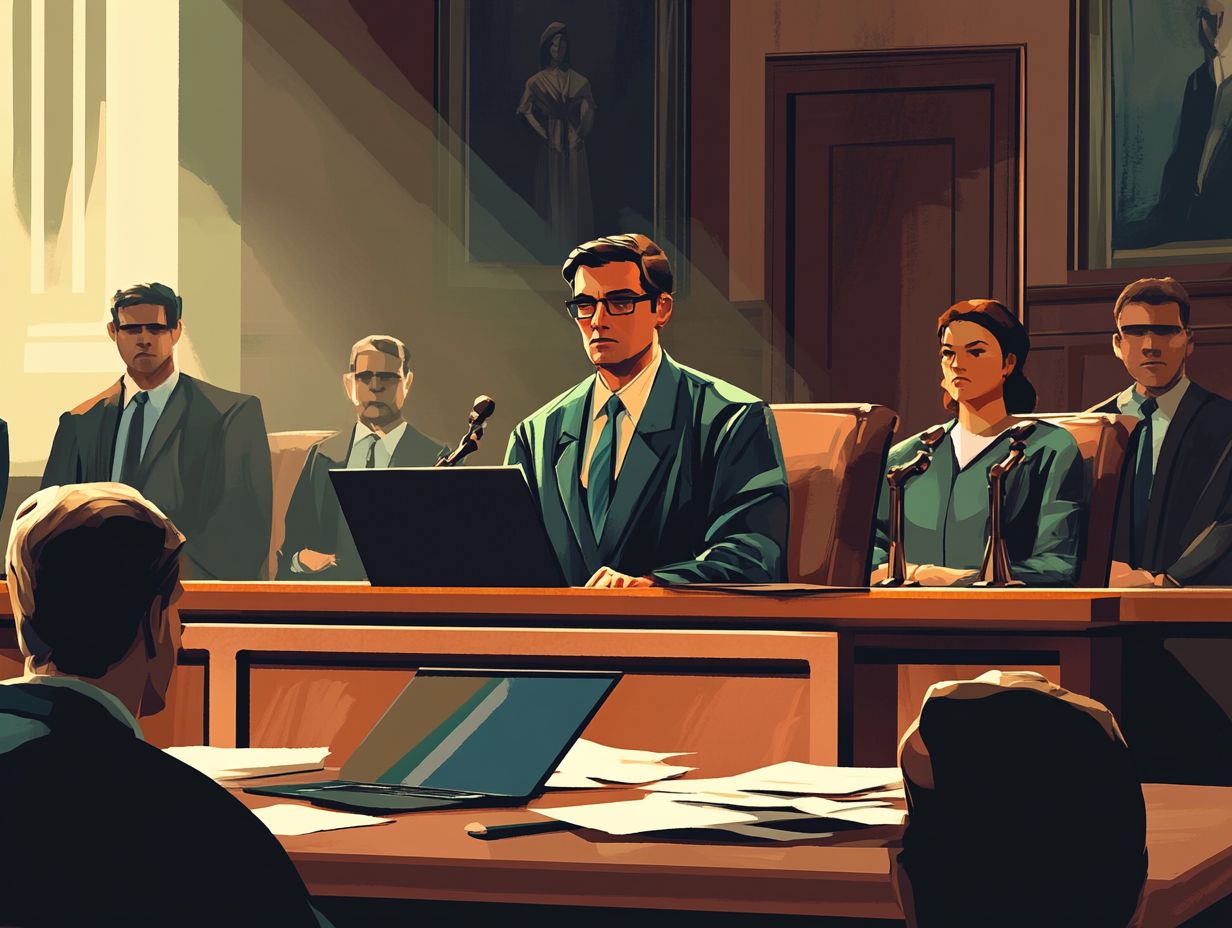
Your strategies for discrediting evidence often revolve around suppressing unlawfully gathered evidence and effectively cross-examining witnesses to challenge their credibility.
As a skilled trial lawyer, you might begin by filing legal motions for suppression, focusing on any evidence obtained in violation of constitutional rights such as illegal searches or coerced confessions. This step is crucial, as it lays the groundwork for contesting the prosecution’s case.
Next, delve into the witnesses’ backgrounds, meticulously probing for inconsistencies in their statements or biases that could compromise their reliability. By highlighting these aspects, you weaken the prosecution’s narrative and bolster the defense’s stance, ensuring jurors critically evaluate the credibility of the evidence presented.
Presenting a Compelling Counter-Narrative
Presenting a compelling counter-narrative is essential in a criminal trial. This equips the defense to effectively challenge the prosecution’s assertions, utilizing strategic opening statements and closing arguments that highlight reasonable doubt.
This approach strengthens your position and invites the jury to reconsider the evidence presented.
Crafting a Persuasive Argument
Crafting a persuasive argument requires you to strategically employ closing statements that underscore reasonable doubt while effectively communicating the defense strategy to the jury.
As a trial lawyer, you need to combine evidence, witness stories, and emotional points to create a strong argument. By emphasizing critical elements such as the burden of proof and the presumption of innocence, you reinforce the notion that the prosecution has failed to meet its obligations.
Jury instructions are essential in this process, guiding jurors through complex legal standards. Savvy attorneys often encapsulate these instructions during their summations, ensuring jurors grasp their responsibilities and the weight of reasonable doubt, ultimately aiming to sway opinions in favor of the defense.
Frequently Asked Questions
How can I challenge the prosecution’s case?
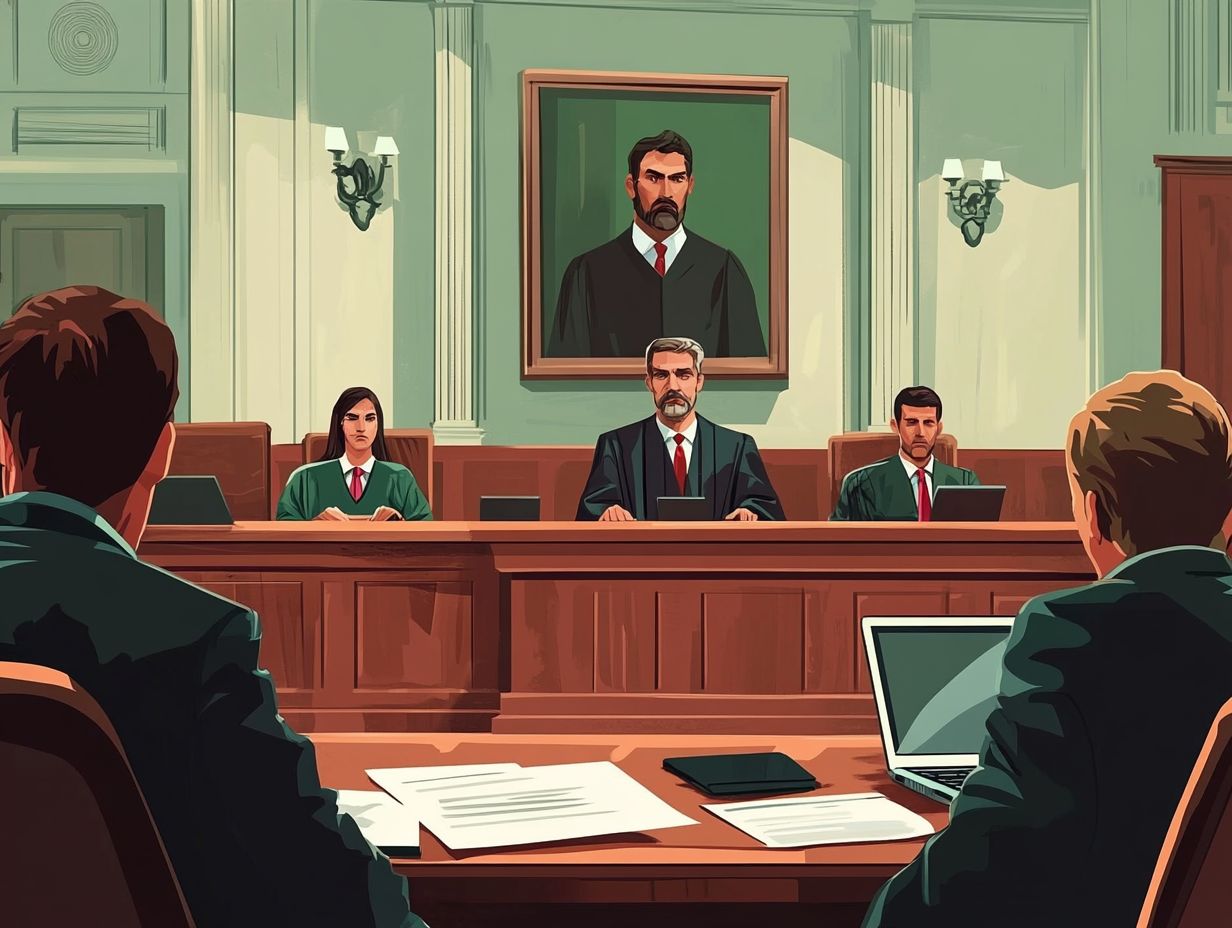
There are several ways to challenge the prosecution’s case, including cross-examining the prosecution’s witnesses, presenting evidence and witnesses to support your defense, and filing pre-trial motions to suppress evidence or dismiss the case entirely.
If you are facing criminal charges, it’s vital to seek legal advice to ensure your rights are protected.
What is the role of cross-examination in challenging the prosecution’s case?
Cross-examination plays a vital role in challenging the prosecution’s case. It lets your attorney question witnesses, revealing weaknesses or inconsistencies in their statements.
What types of evidence can I present to challenge the prosecution’s case?
You can use any relevant evidence to challenge the prosecution. This includes physical evidence, witness statements, or expert opinions.
Can I challenge the prosecution’s case before trial?
Yes, you can challenge the prosecution before the trial starts. This is done by filing motions, such as requests to exclude evidence or dismiss the case due to insufficient legal grounds.
What happens if I successfully challenge the prosecution’s case?
If you succeed in your challenge, the charges may be reduced or dropped. This can lead to a much better outcome for your situation.
What if I cannot challenge the prosecution’s case?
If you cannot challenge the prosecution’s case, don t worry options still exist. Your attorney can negotiate a plea deal or build a strong defense at trial to aim for a not guilty verdict.

